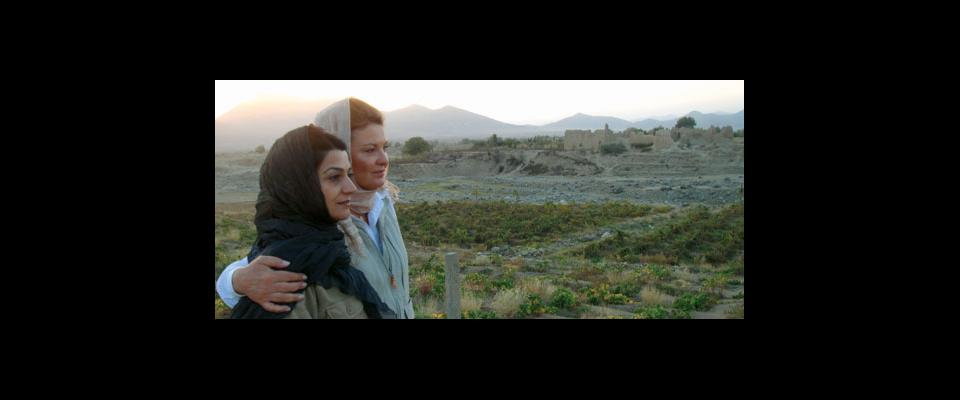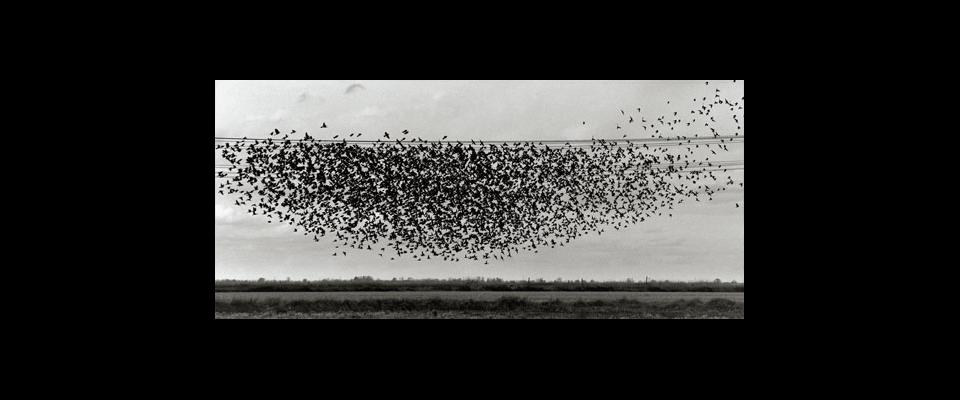Through her nonprofit, Berkeley alum Heidi Kühn is helping rid Asia, Africa, and the Balkans of landmines and planting crops in their places. Kuhn won a CAA Excellence in Achievement Award in 2002.
Ana Paula gingerly crosses a field in southern Angola near her home in the central province of Huambo. She is starving, and across the field drapes a thick curtain of branches on a grove of mango trees, their swollen fruit hanging just within reach. Swollen herself at nine months pregnant, she carefully picks her footsteps, trying to feel for the small metal canisters that keep most of the hungry villagers away from these trees. She reaches toward the dangling fruit under the wide leaves. Seconds later, after as long as 30 years in concealment, the landmine she missed as she looked upward detonates.
Nine thousand miles away in Marin County, Heidi Kühn closes her eyes momentarily, as she often does for full effect, as she finishes telling the story. The 48-year-old is the founder of a nonprofit called Roots of Peace, which funds mine-removal efforts and runs education and development programs across Asia, Africa, and the Balkans. In her San Rafael office, Kühn exudes manicured “let’s do lunch” suburban elegance, wearing a sassy pink low-cut blouse with frilly trim, dangly earrings, and stylish shoes. On the office walls, numerous photos show her in more formal attire with international political dignitaries. Though she is a fifth-generation Californian with Irish roots, her dark hair and strong features lead many to assume she is Eastern European or Middle Eastern.
Ana Paula survived the explosion, Kühn says, but gave birth to her child at the same time that doctors amputated her leg. She is one of an estimated 20,000 people every year maimed or killed by landmines and unexploded ordnance (UXO). Although definite numbers are hard to find, some landmine experts have estimated that there are 60 million mines or 71,000 square miles of minefields around the world—enough to cover the entire state of Washington or to allow one explosive for every citizen of the United Kingdom. “When a seed is planted, with sunlight, water, and the human hand, it will grow. That’s economic viability,” Kühn says. “When a landmine is planted, it only creates a lethal harvest for generations to come.”
This is the inspiration for Roots of Peace, she says, which came during a formal dinner she hosted in her San Rafael home for visiting dignitaries the same year that Princess Diana, a landmine removal champion, died.
“It was really an epiphany of sorts. Of turning blood to wine, of turning killing fields into vineyards. I raised my glass in the living room of our home with a toast that ‘the world might go from mines to vines.'”
That toast led to a ten-year mission that began with years of working alone in her basement and has since enveloped her family. Her husband Gary, also a Berkeley graduate, has retired from the tech industry and is now a full-time employee of Roots of Peace. All four of her children have worked in some fashion with the nonprofit, the most visible being Kyleigh, who started at Berkeley last fall.
In conversation, Kühn shows little interest in discussing the details of her organization, preferring to talk instead in broad, emotive strokes about the issue of landmines, which she calls “seeds of hatred.” For her, there is an almost poetic, intrinsic connection between sowing seeds and removing landmines. After a conflict in rural Third World countries, she says, people need their farms for economic stability. But if the very soil they need to sow is riddled with hidden explosives, the country is left paralyzed.
“The African farmer cannot stand on his own two feet when he has the fear of a landmine beneath the sole of his foot,” she says. “The war is ended, but the hatred goes on until every mine is gotten out of the field.”
Kühn’s passionate style, often-grisly stories, and knack for communicating with the public have made Roots of Peace one of the world’s most prominent anti-mine nonprofits. With more than 150 employees in four countries (Croatia, Cambodia, Afghanistan, and Angola—Kühn eventually pulled her workers out of Iraq), one state department director describes the organization as one of the top de-mining nonprofits in the country, doing everything from funding mine removal and mine safety education, to setting up viable agriculture on former minefields, to sponsoring a women’s soccer team. Roots of Peace has funded the removal of more than 100,000 landmines since its inception in 1997 and has raised $15 million in the past three years from the state department, wineries such as Robert Mondavi, and private funders such as Diane Disney Miller, granddaughter of Walt Disney. This year, the Skoll Foundation awarded Kühn a $765,000 grant and in November she won the Bay Area Jefferson Prize for Public Service.
“I think her talents lie in bringing this issue to households,” says Kurt Chesko, program officer with U.K.-based HALO Trust, the world’s largest private de-mining organization. “I really think that her passion is what brings people on board.”
But Chesko says that Roots of Peace is more than just a fundraising organization. In some ways, he says, Kühn’s real focus comes in once the mines are gone. “They’re taking it one step further and they’re developing agriculture on these minefields—effectively jumpstarting local economies,” he says.
At one time, the Shomali Plains just north of Kabul were called the breadbasket of Afghanistan. Today, due to a long, drawn-out war with Russia, Taliban rule, and drought, the once-flowing irrigation channels are dry and the once-fertile plains lie barren. Part of the problem is that farmers are afraid of hidden landmines in the farm fields, but another is that decades of war have wiped out a generation of farmers so that many Afghans returning to their lands are more familiar with pistols than plows. Furthermore, the only market for agriculture is poppies—the main ingredient of opium.
As a result, Roots of Peace spends much of its time regenerating the old irrigation channels and educating farmers in pruning and trellising grapes. Staffers also ship American-made processing equipment to streamline local harvesting. But even if the grapes are grown, harvested, and sent to neighboring markets in India, they may bring low prices. Afghan produce is considered inferior, partly as a matter of prejudice and partly because of primitive shipping practices—much of it travels on the backs of mules.
Kühn says that’s where her husband comes in.
“I was an economics major,” says Gary Kühn, who helped set up the 25-year-old software giant, Adobe Systems. But he says at Roots of Peace, “this is the one position where I have used my background more than anything else.”
He says that establishing farms in former minefields and developing foreign markets for crops is like starting any business, with marketing concerns, personnel issues, and infrastructure problems such as how to keep the grapes fresh from vineyard to market.
Also figuring prominently in the family business is Heidi’s daughter, Kyleigh, who, along with her mom and local ABC news anchor Cheryl Jennings, started a program within Roots of Peace in which schools and organizations around the world donate pennies to de-mine soccer fields and schools in Afghanistan.
Through the program, called “Pennies for Peace,” Kyleigh has raised 10 million pennies ($100,000), met with former Secretary of State Colin Powell, and spoken to youth delegates on the floor of the General Assembly of the United Nations. She takes her experiences in stride, saying they are only natural with a mother like Heidi.
“She was always trying to expose me to different experiences, ever since I was young,” Kyleigh says. “I mean, the first lullaby she taught me was ‘I Am Woman, Hear Me Roar.'”
Kyleigh is in Peace and Conflict Studies at Berkeley while her older brother Tucker studies international development at San Diego State. When talking about the future, Heidi points to her children and happily looks ahead to the demise of her own organization.
“Somehow, somewhere, we have to put down our swords and turn them into plowshares,” she says, closing her eyes again for a second. “I see myself someday putting myself out of business. I would love to de-mine the world.”




















